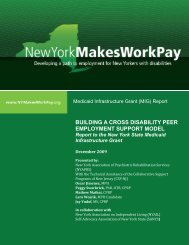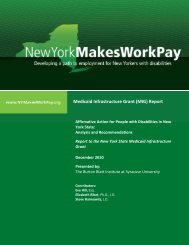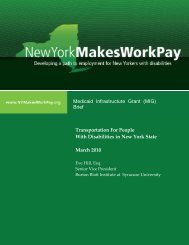Disability & Employment Law in New York State - Cornell University
Disability & Employment Law in New York State - Cornell University
Disability & Employment Law in New York State - Cornell University
You also want an ePaper? Increase the reach of your titles
YUMPU automatically turns print PDFs into web optimized ePapers that Google loves.
<strong>Disability</strong> & <strong>Employment</strong> <strong>Law</strong> <strong>in</strong> <strong>New</strong> <strong>York</strong> <strong>State</strong>:Analysis and Recommendationspassed Genetic Information Nondiscrim<strong>in</strong>ation Act of 2008 (GINA), which providesfederal legal protection for unmanifested genetic conditions. 38c) QualificationWhile <strong>New</strong> <strong>York</strong> is more <strong>in</strong>clusive <strong>in</strong> its def<strong>in</strong>ition of disabilities than the federal law, <strong>New</strong><strong>York</strong> has a special limitation <strong>in</strong> the employment context. As the statute notes: “the term[disability] shall be limited to disabilities which, upon the provision of reasonableaccommodations, do not prevent the compla<strong>in</strong>ant from perform<strong>in</strong>g <strong>in</strong> a reasonablemanner the activities <strong>in</strong>volved <strong>in</strong> the job or occupation sought or held.” 39 In other words,legally a disability is only a disability for the purposes of an employment discrim<strong>in</strong>ationclaim if a person is able to perform the job with any needed reasonableaccommodations. The ADA has no such exclusion; whether a disability is recognizedas a disability does not depend on whether a person can do a given job. However, theADA accomplishes essentially the same outcome, by requir<strong>in</strong>g pla<strong>in</strong>tiffs to establish thatthey are qualified to do the job, with or without reasonable accommodation. 40 Althoughthe federal and state laws are different <strong>in</strong> their def<strong>in</strong>ition, <strong>in</strong> practice, the result is likely tobe the same: people with disabilities must demonstrate that they are qualified to do ajob with reasonable accommodations, or a discrim<strong>in</strong>ation claim will be unsuccessful.It should still be acknowledged that there is at least a technical difference between thetwo. If a person cannot demonstrate that he or she is qualified to do a job, onceaccommodated reasonably, under federal law this means the person with a disability didnot experience unlawful discrim<strong>in</strong>ation. Under the NYSHRL, this means a person is, atleast <strong>in</strong> the employment context, not a person with a disability.The NYSHRL requires a person with a disability to be qualified to perform “the activities<strong>in</strong>volved <strong>in</strong> the job” “<strong>in</strong> a reasonable manner.” 41 The NYSHRL does not provide specificguidance for determ<strong>in</strong><strong>in</strong>g when a person is qualified to perform a given job, beyond<strong>in</strong>dicat<strong>in</strong>g that an employee should be able to perform a job <strong>in</strong> a reasonable manner,either without or without reasonable accommodations. 42 In contrast, the ADA basesqualification on whether a person can perform the “essential functions” of a job with orwithout accommodation. 43 The ADA provides some deference to employers <strong>in</strong> def<strong>in</strong><strong>in</strong>gwhat the essential functions are, for <strong>in</strong>stance, based on a published job description. 44While the language varies, there is no <strong>in</strong>dication <strong>in</strong> this <strong>in</strong>stance that either standard orfram<strong>in</strong>g is, <strong>in</strong> practice, more or less protective of workers with disabilities.d) AssociationThe ADA recognizes that family members, caregivers, and other associates of peoplewith disabilities are often subjected to discrim<strong>in</strong>ation because of their relationships. Forexample, employers may be unwill<strong>in</strong>g to hire a parent or spouse of a person with a38 See Public <strong>Law</strong> 110-233, 122 Stat. 881 (2008).39 N.Y. Exec. <strong>Law</strong> § 292(21).40 ADA, 42 U.S.C. § 12113(a).41 N.Y. Exec. <strong>Law</strong> § 292(21-e).42 N.Y. Exec. <strong>Law</strong> § 292 (21-3).43 42 U.S.C. § 12111(8).44 Id.8





